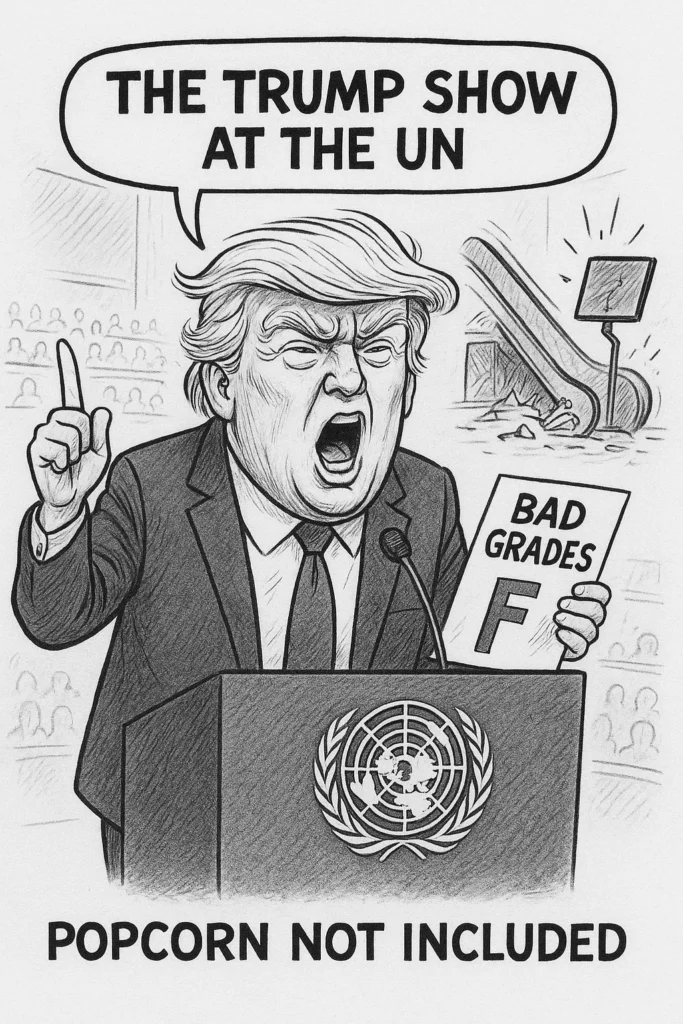The Trumpian Bluff: A Unipolar Fantasy in a Multipolar World and What It Means for Africa
TRANSCEND MEMBERS, 6 Oct 2025
Raïs Neza Boneza – TRANSCEND Media Service
28 Sep 2025 – The spectacle of a United Nations General Assembly is often a theater of global power dynamics. When President Trump took the stage, it was a performance of deliberate disruption. He distributed “bad grades,” mocked the institution’s malfunctioning escalators and teleprompters, and donned what critics call his “habitual suit as master of a unipolar world.” This display, however, is more than just political theater; it is a symptom of a deeper chaos in the international order—a chaos that presents both profound risks and strategic opportunities for the African continent.
From a Pan-African viewpoint, the analysis must move beyond the ephemeral “bluffs” and “flip-flops” of American domestic politics and focus on the structural shifts they reveal. The decline of American unipolarity is not an event to be mourned but a reality to be navigated with shrewd and unified strategy.
The Illusion of the Peacemaker and the Reality of Prolonged Conflict
Trump’s central claim at the UN was that of a peacemaker, boasting of having ended “seven wars.” Yet, a critical analysis reveals this to be a “panegyric for domestic consumption.” For exemple In Ukraine, Trump simultaneously pursued dialogue with Russia while greenlighting a $100 billion aid package to Kyiv, effectively prolonging the conflict he claimed to want to end.
For Africa, this is a critical lesson. The wars funded and fueled by external powers are rarely about the people on the ground; they are about geopolitical leverage and commercial interests.
On the continent , a “catastrophic diplomatic” approach is applied where the “dividends of war” are prioritized over the “dividends of peace.” African nations, often caught in the crossfire of such proxy conflicts or used as pawns in UN voting blocs, must recognize that their stability is secondary to the economic and strategic games of external powers. The message is clear: Africa’s peace cannot be outsourced.
Palestinian Recognition: A Geopolitical Sea Change and a Lesson in Collective Action
One of the most significant developments at the UN was the wave of recognitions for the State of Palestine, bringing the total to 151 member states. This is not merely a symbolic gesture. From a Pan-African analytical lens, this is a masterclass in collective geopolitical pressure. The goal, as stated, is to “increasingly isolate the American-Zionist couple,” forcing the U.S. to eventually tell Israel, “we can no longer follow you.”
This strategy holds a powerful lesson for Africa. It demonstrates that when the Global South acts in concert, it can shift the global consensus and pressure even the most entrenched alliances. The “two weights, two measures” cited in the context of Israel—where it faces threats of sanctions but no concrete action despite its military campaign—is a familiar reality for Africa, which has long suffered under a discriminatory international financial and political system. The Palestinian cause, in this instance, becomes a mirror reflecting the potential power of a unified African and Global South bloc to challenge historical injustices and impose a new, more equitable diplomatic calculus.
Iran and the Forthcoming Multipolar Reality
The analysis of Iran’s position is particularly insightful for Africa’s future. The assessment that Iran, after being bombed despite adhering to nuclear agreements, may now be pushed toward a “North Korean trajectory” of acquiring a nuclear bomb for respect, is a stark warning. The subsequent nuclear proliferation in the Middle East would fundamentally reshape global security.
For Africa, a continent committed to nuclear-weapon-free zones, this escalating tension between major global powers and regional “pivotal states” is a double-edged sword. On one hand, it diverts attention and resources away from the continent. On the other, it reinforces the necessity of Africa’s stated policy of “non-alignment,” which must evolve into a proactive and strategic “multi-alignment.” As the U.S., Europe, Russia, and China jockey for influence, Africa’s vast resources, growing market, and UN voting bloc become invaluable leverage. The continent must resist being drawn into these new cold wars and instead focus on extracting maximum benefit for its own development, playing competing powers against each other with a clear, self-interested agenda.
The NATO Provocation and the “Dough of War”
The reported incursions of unidentified drones over NATO countries, instantly attributed to Russia without evidence, is identified as a potential “media manipulation” operation. The goal, as critically analyzed, is to knead the “dough of European public opinion” with the “yeast of anti-Russian sentiment” to justify massive, continued military spending. This is framed as an “economic predation operation” akin to the COVID-19 crisis, where public fear is leveraged to transfer wealth to the military-industrial complex.
As the great powers prepare for potential conflict, Africa must guard against becoming a staging ground or a theater for these new confrontations. The continent must reject any pressure to host foreign bases or join military alliances that do not serve its direct security interests. The primary lesson from the Trumpian “bluff” and the Western response is that these nations will always prioritize their own economic and strategic interests. Africa must do the same.
The Imperative of African Agency
The Trumpian spectacle at the UN is not an anomaly but an acceleration of a trend: the demise of a U.S.-led world order. The accompanying volatility, from Ukraine to Gaza, and the cynical games of power, are not Africa’s problems to solve. They are, however, the environment in which Africa must survive and thrive.
The path forward is not in pleading for a seat at a broken table but in building a more robust one of its own. This requires strengthening continental institutions like the African Union, advancing the African Continental Free Trade Area (AfCFTA) to enhance economic sovereignty, and forging a common, assertive foreign policy. The recognition of Palestine by a global majority shows that collective action works. It is time for Africa to apply that same unified strategic pressure to dismantle the neo-colonial economic structures, achieve permanent representation on the UN Security Council, and ensure that the unfolding multipolar world does not become a new era of exploitation, but a genuine dawn of African agency and self-determination.
____________________________________________
 Raïs Neza Boneza is the author of fiction as well as non-fiction, poetry books and articles. He was born in the Katanga province of the Democratic Republic of Congo (Former Zaïre). He is also an activist and peace practitioner. Raïs is a member of the TRANSCEND Media Service Editorial Committee and a convener of the TRANSCEND Network for Peace Development Environment for Central and African Great Lakes. He uses his work to promote artistic expressions as a means to deal with conflicts and maintaining mental wellbeing, spiritual growth and healing. Raïs has travelled extensively in Africa and around the world as a lecturer, educator and consultant for various NGOs and institutions. His work is premised on art, healing, solidarity, peace, conflict transformation and human dignity issues and works also as freelance journalist. You can reach him at rais.boneza@gmail.com – http://www.raisnezaboneza.no
Raïs Neza Boneza is the author of fiction as well as non-fiction, poetry books and articles. He was born in the Katanga province of the Democratic Republic of Congo (Former Zaïre). He is also an activist and peace practitioner. Raïs is a member of the TRANSCEND Media Service Editorial Committee and a convener of the TRANSCEND Network for Peace Development Environment for Central and African Great Lakes. He uses his work to promote artistic expressions as a means to deal with conflicts and maintaining mental wellbeing, spiritual growth and healing. Raïs has travelled extensively in Africa and around the world as a lecturer, educator and consultant for various NGOs and institutions. His work is premised on art, healing, solidarity, peace, conflict transformation and human dignity issues and works also as freelance journalist. You can reach him at rais.boneza@gmail.com – http://www.raisnezaboneza.no
Tags: Africa, Israel, Multipolar World Order, NATO, Palestine, Trump, UNGA, USA, Unipolar World, United Nations
DISCLAIMER: The statements, views and opinions expressed in pieces republished here are solely those of the authors and do not necessarily represent those of TMS. In accordance with title 17 U.S.C. section 107, this material is distributed without profit to those who have expressed a prior interest in receiving the included information for research and educational purposes. TMS has no affiliation whatsoever with the originator of this article nor is TMS endorsed or sponsored by the originator. “GO TO ORIGINAL” links are provided as a convenience to our readers and allow for verification of authenticity. However, as originating pages are often updated by their originating host sites, the versions posted may not match the versions our readers view when clicking the “GO TO ORIGINAL” links. This site contains copyrighted material the use of which has not always been specifically authorized by the copyright owner. We are making such material available in our efforts to advance understanding of environmental, political, human rights, economic, democracy, scientific, and social justice issues, etc. We believe this constitutes a ‘fair use’ of any such copyrighted material as provided for in section 107 of the US Copyright Law. In accordance with Title 17 U.S.C. Section 107, the material on this site is distributed without profit to those who have expressed a prior interest in receiving the included information for research and educational purposes. For more information go to: http://www.law.cornell.edu/uscode/17/107.shtml. If you wish to use copyrighted material from this site for purposes of your own that go beyond ‘fair use’, you must obtain permission from the copyright owner.
Join the discussion!
We welcome debate and dissent, but personal — ad hominem — attacks (on authors, other users or any individual), abuse and defamatory language will not be tolerated. Nor will we tolerate attempts to deliberately disrupt discussions. We aim to maintain an inviting space to focus on intelligent interactions and debates.
